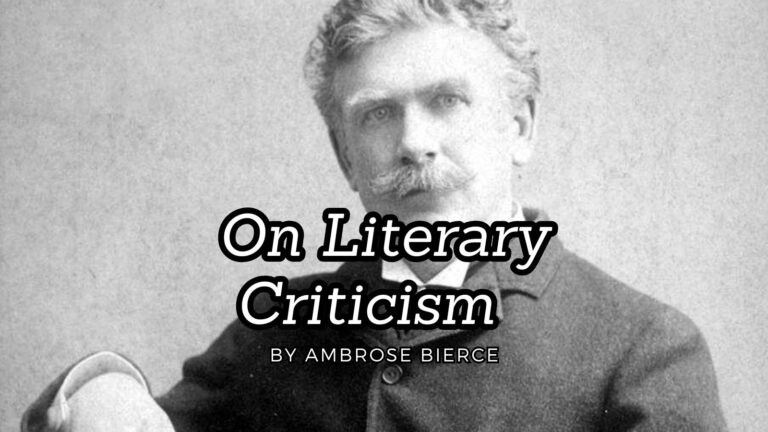—Cui mens divinior, atque os
Magna sonaturum des nominis hujus honorem.
Hor., Sat. i. 4, 43.
On him confer the poet’s sacred name,
Whose lofty voice declares the heavenly flame.
 There is no character more frequently given to a writer than that of being a genius. I have heard many a little sonneteer called a fine genius. There is not a heroic scribbler in the nation that has not his admirers who think him a great genius; and as for your smatterers in tragedy, there is scarce a man among them who is not cried up by one or other for a prodigious genius.
There is no character more frequently given to a writer than that of being a genius. I have heard many a little sonneteer called a fine genius. There is not a heroic scribbler in the nation that has not his admirers who think him a great genius; and as for your smatterers in tragedy, there is scarce a man among them who is not cried up by one or other for a prodigious genius.
My design in this paper is to consider what is properly a great genius, and to throw some thoughts together on so uncommon a subject.
Among great geniuses those few draw the admiration of all the world upon them, and stand up as the prodigies of mankind, who, by the mere strength of natural parts, and without any assistance of art or learning, have produced works that were the delight of their own times and the wonder of posterity. There appears something nobly wild and extravagant in these great natural geniuses, that is infinitely more beautiful than all turn and polishing of what the French call a bel esprit, by which they would express a genius refined by conversation, reflection, and the reading of the most polite authors. The greatest genius which runs through the arts and sciences takes a kind of tincture from them and falls unavoidably into imitation.
Many of these great natural geniuses, that were never disciplined and broken by rules of art, are to be found among the ancients, and in particular among those of the more Eastern parts of the world. Homer has innumerable flights that Virgil was not able to reach, and in the Old Testament we find several passages more elevated and sublime than any in Homer. At the same time that we allow a greater and more daring genius to the ancients, we must own that the greatest of them very much failed in, or, if you will, that they were much above the nicety and correctness of the moderns. In their similitudes and allusions, provided there was a likeness, they did not much trouble themselves about the decency of the comparison: thus Solomon resembles the nose of his beloved to the tower of Lebanon which looketh towards Damascus, as the coming of a thief in the night is a similitude of the same kind in the New Testament. It would be endless to make collections of this nature. Homer illustrates one of his heroes encompassed with the enemy, by an ass in a field of corn that has his sides belaboured by all the boys of the village without stirring a foot for it; and another of them tossing to and fro in his bed, and burning with resentment, to a piece of flesh broiled on the coals. This particular failure in the ancients opens a large field of raillery to the little wits, who can laugh at an indecency, but not relish the sublime in these sorts of writings. The present Emperor of Persia, conformable to this Eastern way of thinking, amidst a great many pompous titles, denominates himself “the sun of glory” and “the nutmeg of delight.” In short, to cut off all cavilling against the ancients, and particularly those of the warmer climates, who had most heat and life in their imaginations, we are to consider that the rule of observing what the French call the bienseance in an allusion has been found out of later years, and in the colder regions of the world, where we could make some amends for our want of force and spirit by a scrupulous nicety and exactness in our compositions. Our countryman Shakespeare was a remarkable instance of this first kind of great geniuses.
I cannot quit this head without observing that Pindar was a great genius of the first class, who was hurried on by a natural fire and impetuosity to vast conceptions of things and noble sallies of imagination. At the same time can anything be more ridiculous than for men of a sober and moderate fancy to imitate this poet’s way of writing in those monstrous compositions which go among us under the name of Pindarics? When I see people copying works which, as Horace has represented them, are singular in their kind, and inimitable; when I see men following irregularities by rule, and by the little tricks of art straining after the most unbounded flights of nature, I cannot but apply to them that passage in Terence:
—Incerta hæc si tu postules
Ratione certâ facere, nihilo plus agas
Quâm si des operam, ut cum ratione insanias.
Eun., Act I., Sc. 1, I. 16.
You may as well pretend to be mad and in your senses at the same time, as to think of reducing these uncertain things to any certainty by reason.
In short, a modern Pindaric writer compared with Pindar is like a sister among the Camisars compared with Virgil’s Sibyl; there is the distortion, grimace, and outward figure, but nothing of that divine impulse which raises the mind above itself, and makes the sounds more than human.
There is another kind of great geniuses which I shall place in a second class, not as I think them inferior to the first, but only for distinction’s sake, as they are of a different kind. This second class of great geniuses are those that have formed themselves by rules, and submitted the greatness of their natural talents to the corrections and restraints of art. Such among the Greeks were Plato and Aristotle; among the Romans, Virgil and Tully; among the English, Milton and Sir Francis Bacon.
The genius in both these classes of authors may be equally great, but shows itself after a different manner. In the first it is like a rich soil in a happy climate, that produces a whole wilderness of noble plants rising in a thousand beautiful landscapes without any certain order or regularity; in the other it is the same rich soil, under the same happy climate, that has been laid out in walks and parterres, and cut into shape and beauty by the skill of the gardener.
The great danger in these latter kind of geniuses is lest they cramp their own abilities too much by imitation, and form themselves altogether upon models, without giving the full play to their own natural parts. An imitation of the best authors is not to compare with a good original; and I believe we may observe that very few writers make an extraordinary figure in the world who have not something in their way of thinking or expressing themselves, that is peculiar to them, and entirely their own.
It is odd to consider what great geniuses are sometimes thrown away upon trifles.
“I once saw a shepherd,” says a famous Italian author, “who used to divert himself in his solitudes with tossing up eggs and catching them again without breaking them; in which he had arrived to so great a degree of perfection that he would keep up four at a time for several minutes together playing in the air, and falling into his hand by turns. I think,” says the author, “I never saw a greater severity than in this man’s face, for by his wonderful perseverance and application he had contracted the seriousness and gravity of a privy councillor, and I could not but reflect with myself that the same assiduity and attention, had they been rightly applied, ‘might’ have made a greater mathematician than Archimedes.”
- How to Edit your poetry for beginners and beyond (with worksheet) - April 18, 2025
- 20 Forgotten Gothic Stories Writers Need to Rediscover - April 18, 2025
- The Writer’s Roadmap: Embracing Outlining (Free Worksheet Included!) - April 15, 2025






